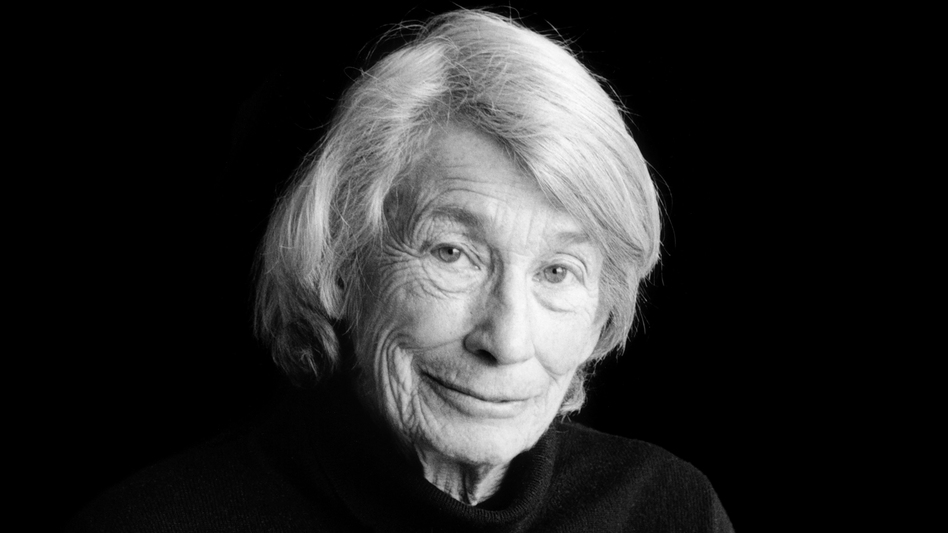I don’t know what to say about Mary Oliver’s death except that she was a great and beloved poet, and also my teacher and academic adviser, and that she was kind to me. She was absurdly generous. I first met her as if inside one of her poems: in a field of tall September grass, under a big bowl of stars just before dawn. It was my first week of college, and I hadn’t been able to sleep with excitement. I had thrown a Fair Isle sweater on over my flannel pajamas, slipped some hiking boots over fleece socks, and run out into the sleeping world. I was entering the field, by the reeds of the nearby pond, when I heard her coming along the path, a small, unknown figure walking with two dogs. Unassuming yet unmistakable. Perhaps I should not say that we “met” there, since we didn’t speak. We merely nodded as if it were normal to be up at that hour, passing in the dark. When I later introduced myself properly, I’d like to think that she remembered me as the girl from the field.
Perhaps she did. As she wrote in her essay “Wordsworth’s Mountain”:
But dawn—dawn is a gift. Much is revealed about a person by his or her passion, or indifference, to this opening of the door of day. No one who loves dawn, and is abroad to see it, could be a stranger to me.
As a teacher, Mary had almost no ego at all. In an act of generosity that I only now, as a “published writer,” can fully appreciate, she would bring into class her own failed poems—efforts at expressing some experience or sense or truth that would remain private and not be sent out into the world. She would talk about why they did not work. She was matter of fact about her failure. I remember one such poem she brought in, which she had called “The Pony Express.” Something about riders adrift in the landscape. She explained how she had tried but failed to express a vastness, and a loneliness, that were not coming through. Later, it would seem, she did rework this poem and publish it in her book Swan: Poems and Prose Poems (2010), under the title “The Riders.” It ends:
This detail from our country’s past
has no particular significance—it is only
a footnote. There were plenty
of orphans and the point of course
was to get the mail through, so the theory
was sound. And besides
think of those rough, lean boys—
how light and hard they would ridefleeing the great loneliness.
I find it encouraging to know that even this small poem lived in draft form for at least twelve years, changing bit by bit, before it was published. I wish I had kept the earlier, “failed” version. Perhaps it is somewhere in my possessions, tucked inside an old black notebook filled with my own long-forgotten poetic efforts. The secret to all of it, she said, was not just the ideas or the images, of course, but the music—the rhythm and flavor of the words, their alliteration and the rat-tat, rat-a-tat-tat of them. This was the secret code you could knock onto the door of the heart to gain entry.
Mary was, I think, a fundamentally American poet. There was a view in her poems and in her person of an America that was both beautiful and profoundly lonely. She was not blind to the country’s unthinkably cruel and violent past; nor did she imagine the natural world that she loved so much as an empty Eden. She saw it, very clearly, as a treasure stolen from someone else.
She tried to nudge me toward the bigness of the world while also never showing disrespect to the relatively small things that troubled me. As she well knew, the big and the small weigh the same. When I got my heart broken my sophomore year, she let me cry in her warm office that smelled of wood and old radiators as the rain fell outside, before gently suggesting that the best thing to do was to just get back to work. She felt the thinness of this world pressing itself through the reeds her whole life. Death like an owl. Death like a bridegroom. Death like a dark cabin, a curiosity, a thief, a hungry bear, a silence. Death like a stranger passing you with her dogs in a field of tall grass, just before dawn, who will one day turn to you and say, perhaps kindly, hello.
Summer Brennan in a journalist and author living in New York and New Mexico. She studied poetry and prose with Mary Oliver at Bennington College in Vermont from 1997 to 2001. Her next book, High Heel, will be published in March 2019 by Bloomsbury.
from The Paris Review http://bit.ly/2Fx6ALN

Comments
Post a Comment